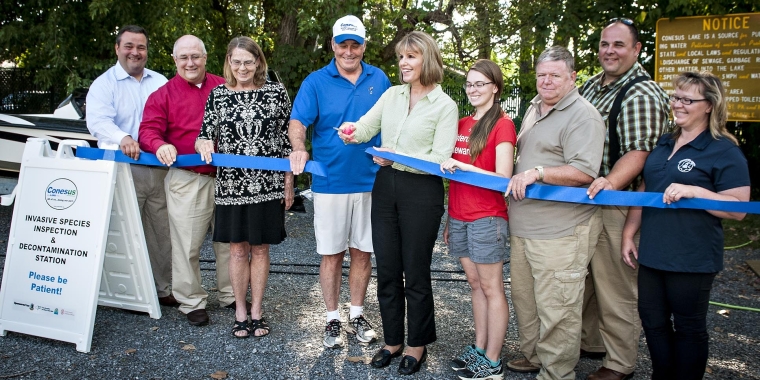
New Conesus Lake Boat Decontamination Station Will Help Prevent Invasive Species
September 2, 2016

LIVONIA – A healthy and dynamic Conesus Lake is important to the area’s economy and the local drinking water supply.
To help protect against invasive species that could damage the fragile ecosystem of the lake, Senator Catharine Young (R,C,I- 57th District) secured $50,000 in state assistance for the Conesus Lake Association, which was used for the installation of a new boat decontamination station that was celebrated at a grand opening today.
“This new boat washing station is positive news for the area residents and visitors who enjoy Conesus Lake. Livingston County and the entire Finger Lakes Region receives a tremendous economic benefit from having a vibrant and healthy Conesus Lake. The lake also is a major drinking water resource, supplying fresh water to thousands of people in the surrounding towns and villages,” said Senator Young.
“Conesus Lake is beloved by many, including me, for its small-craft boating and fishing potential. I have many childhood memories of Conesus Lake, and we want future generations to have the same recreational opportunities. This new boat washing station will help keep harmful microorganisms and other contaminants out of the lake, so that it can be enjoyed by everyone for many years to come,” Senator Young said.
The Conesus Lake Association, along with several partner agencies and organizations, has been funding a Watercraft Steward Program as a ‘first line of defense’ for several years. However, all involved knew that visual inspections could only stop a portion of the many threats the lake faces.
Association representatives and local officials said they were “thrilled” to have this new decontamination station as a tool in their effort to protect and promote the quality of the lake.
Scott Proctor, Director of the Conesus Lake Association and Project Manager for the Boat Decontamination Station, said, “This project, since its inception, has been an amazing story of teamwork and cooperation. The Conesus Lake Association would like to thank all involved, especially Senator Young, the New York State Office of Parks, Recreation and Historic Preservation, the Department of Environmental Conservation, Cornell Cooperative Extension Livingston County and the Livingston County Watershed Council. Our Watercraft Steward Program has grown in recent years to reach over 10,000 boaters last year, while the percentage of contaminated boats coming from other lakes continues to drop. This boat decontamination station will provide an important new capability in the fight against aquatic invasive species and our efforts to keep Conesus Lake healthy and vibrant.”
Town of Conesus Supervisor Brenda Donohue said, “On behalf of all the members of the Conesus Lake Watershed Council, I would like to express our gratitude to Senator Young for securing this boat wash station for the benefit of Conesus Lake and all who use or live on this lake today, and in the future. We are today’s stewards of Conesus Lake, and a valuable tool to combat invasive aquatic species has just been added to our toolbox. This boat wash station not only serves the function of removing potential dangerous hitchhikers from boats, trailers and ballasts. It also serves as a powerful educational tool for the boating public; a reminder that we are all stewards of Conesus Lake.”
According to the state Department of Environmental Conservation (DEC), boats can spread aquatic invasive species from water body to water body unless properly decontaminated using a process commonly known as “Clean, Drain and Dry.”
Several years ago, a study was done and it was determined that more boats visit Conesus than any of the other 22 locations spread across nine Finger Lakes and Lake Ontario, averaging 90 boats per day. This high frequency of boat traffic puts Conesus Lake at high risk for the introduction of new and harmful aquatic invasive species.
This new boat washing station will help keep harmful aquatic invasive species out of the water by providing the capability for the lake’s Watercraft Stewards to decontaminate internal portions of a boat, along with washing the external surfaces, if a boat owner agrees to the voluntary process. Stewards are given proper training and follow detailed protocols to clean the portions of a boat that they suspect could be contaminated.
Share this Article or Press Release
Newsroom
Go to NewsroomSenate Democrats Fail Taxpayers
January 14, 2019
Senator Young Expresses Opposition to Public Campaign Financing
January 7, 2019